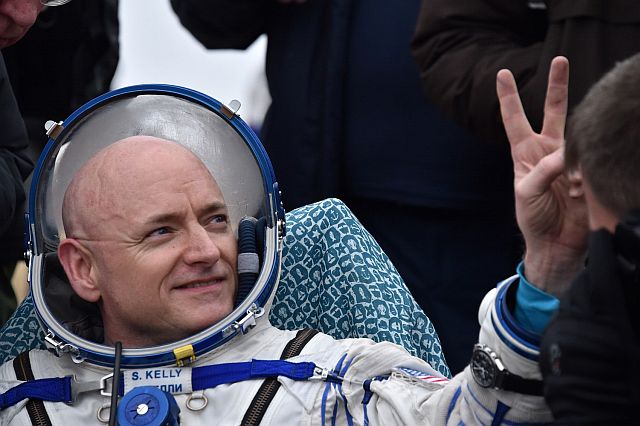
International Space Station (ISS) crew member Scott Kelly of the U.S. shows a victory sign after landing near the town of Dzhezkazgan, Kazakhstan, on Wednesday, March 2, 2016. The Soyuz TMA-18M spacecraft landed with Expedition 46 Commander Scott Kelly of NASA and Russian cosmonauts Mikhail Kornienko and Sergey Volkov of Roscosmos. (AP PHOTO)
Ah, there’s nothing like a blast of fresh, frigid air to welcome you back to the planet after nearly a year cooped up in space.
That’s the word from astronaut Scott Kelly, NASA’s space-endurance champ who returned to bitterly cold Kazakhstan on Wednesday, along with his roommate for the past year, Russian cosmonaut Mikhail Kornienko.
In a NASA interview before heading home to Houston, Kelly said it was “amazing” to feel the cold air when the hatch of his Soyuz capsule popped open after touchdown.
“I don’t mean to say it’s not fresh on the space station,” he said, “but there’s nothing like new cold air coming into the capsule.”
Both Kelly, 52, and Kornienko, 55, yearned for nature throughout their 340-day mission at the International Space Station, a dry run by NASA for eventual trips to Mars.
“Just like Scott, I wanted to see Earth and I wanted to smell that fresh air. This is an unforgettable feeling,” Kornienko said.
It was the longest an American ever lived in space, although nothing new for the Russians. The world record is 438 days, set back in the mid-1990s at the former Mir space station. Even before that, a pair of Soviet cosmonauts had racked up a full one-year spaceflight.
“Congratulations on your record,” former cosmonaut and Kazak space agency chief Talgat Musabayev said at a welcoming ceremony. He couldn’t resist: “Of course, it was already done 28 years ago.”
President Barack Obama joined the chorus of praise pouring in.
“Welcome back to Earth, @StationCDRKelly! Your year in space is vital to the future of American space travel. Hope gravity isn’t a drag!” Obama said via Twitter.
The White House said Obama spoke with Kelly on Wednesday, thanking him for his service and for sharing his journey through social media. Kelly posted hundreds of photos of Earth.
After landing, the latest one-year space subjects quickly parted company, Kelly flying back to Houston and Kornienko to Star City, Russia, near Moscow. While en route, Kelly tweeted a picture of his first salad back on Earth, noting it will be important to grow fresh food during Mars expeditions, like his space station lettuce crop.
Kelly acknowledged it was bittersweet leaving the space station — his home since last March, currently staffed by three men until the arrival of three more in two weeks.
“I’d been there a long time, so I looked forward to leaving. But at the same time, it’s a magnificent place and I’m going to miss it,” he said.
Neither will be saying goodbye — in Russian, do svidaniya — to medical tests anytime soon.
Minutes after emerging from their capsule, they were whisked in chairs to a medical tent where they did their best to stand, walk, jump, navigate obstacles — everything an astronaut might need to do immediately upon arriving at Mars.
NASA aims to put astronauts on the red planet in the 2030s, but first wants to know how the body — and mind — will fare during the 2½-year expedition. Kelly ranked physical isolation aboard the 250-mile-high platform, from those he loved, as his biggest challenge.
Disclaimer: The comments uploaded on this site do not necessarily represent or reflect the views of management and owner of Cebudailynews. We reserve the right to exclude comments that we deem to be inconsistent with our editorial standards.
